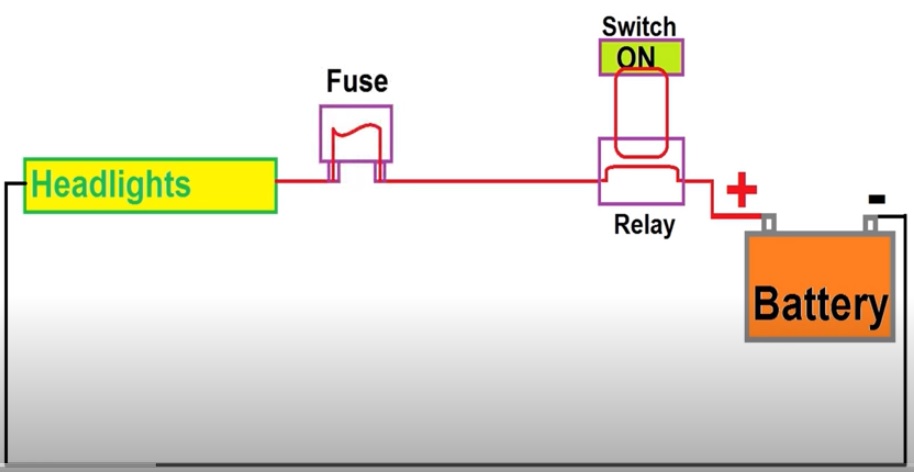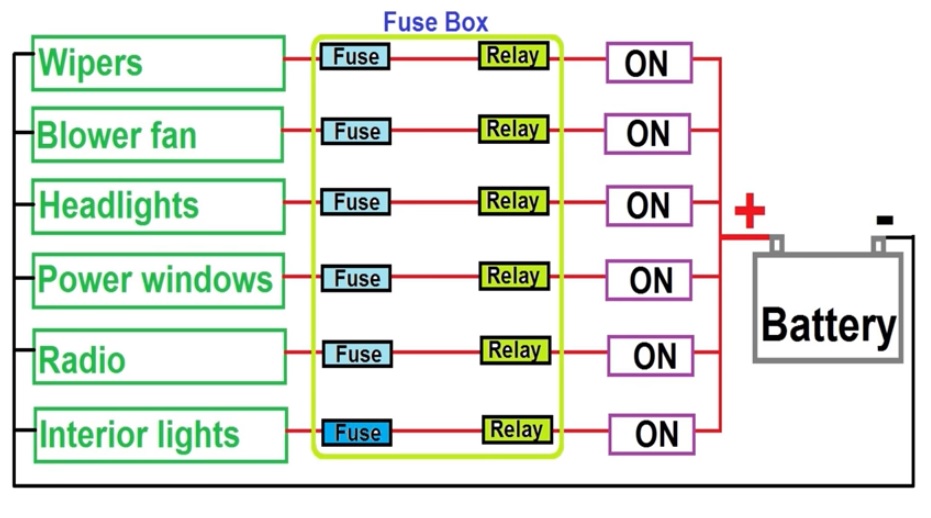![]()
Symptoms of Blown Car Fuse [Circuit Overload]
DISCLAIMER: AS AN AMAZON ASSOCIATE I EARN FROM QUALIFYING PURCHASES. THIS POST CONTAINS AFFILIATE LINKS THAT WILL REWARD ME MONETARILY OR OTHERWISE WHEN YOU USE THEM TO MAKE QUALIFYING PURCHASES. FOR MORE INFORMATION, PLEASE READ MY EARNINGS DISCLAIMER.
|
The blown fuse in a car is usually a result of a circuit overload (too many fun accessories turned ON and all at once) or a short circuit. Problems with fuses are usually the easiest ones to handle, all you have to do is replace a fuse.
If you just overloaded the circuit, then removing a few devices from it will keep your fuses from blowing. If any of your switches and motors have an internal short (the fuse blows again and again), then see your mechanic ASAP!
You will have to turn off some devices and accessories in your car and see if that solves your problem with the fuse. If it does not, then unless you are experienced in handling electrical problems with your car, you better do yourself a favor and ask your mechanic to figure it out.
What causes blown fuses in cars?
When any of the car components stop working (lights, electric side mirrors, radio, etc), the first thing to check is for a blown fuse. If you know for sure that your problem is not caused by the alternator or battery, it must be the fuse (and it is the easiest one to check).
Some people don’t even realize that they have a blown fuse until they notice that:
- The backup lights are not working
- The interior lights are not working
- Electric side mirrors are not turning
- Radio stops working
- The turn signal light is out
- The window wiper is not moving
- Climate control is misbehaving
- Heating and cooling fans are letting you down
- The air conditioning took a “day off”
- The power seat is no longer a “power seat”
- Electric fuel pumps are not giving you fuel
- Your car won’t even start (very rare case)
If you just had your car fuse blown, the first thing to do is to check your owner’s manual to find out which electric circuit it belongs to. If you replaced a fuse and a problem does not occur, there is usually nothing to worry about.
But if it blows again, it could be the indication of an electrical short that definitely needs to be fixed ASAP. If you have multiple electric problems in your vehicle, this could be a serious issue that needs professional diagnostics.
Having a blown car fuse is actually a good thing because it just saved your delicate electronic devices from being burned by excessive electricity. Getting a new fuse is a lot cheaper than getting new electronic devices, but the cause of the problem still needs to be figured out.
** Please note! It is very easy to overlook that the fuse was blown and take your car to the repair shop immediately.
If only one electrical device in your car malfunctions, then it is probably a fuse and it’s not complicated to check.
There are many reasons behind blown fuses and I will go over them in the following chapters:
1. Simple reasons for a blown fuse
This could be anything from you using all your fancy electronic accessories at the same time, all the way to the fuse going “over the hill” and just dying on you! It could also be a poor-quality fuse or simply a dirty one.
If your fuse was replaced with smaller than usual amperage (you normally use 30 amps, but you’ve got a 15 amp fuse, for example), it will interrupt the NORMAL flow of electricity needed for your equipment by blowing and disconnecting the circuit. In the last case, all you have to do is replace it with the fuse with the correct amount of AMP needed.
2. Complex reasons for blown fuses
Anything from faulty wiring to a short circuit could be a problem and this usually requires a professional to figure out. If any of the “simple reasons” do not apply to you, you probably want to see your mechanic before this gets out of hand.
But before you get going, check if the fuse for this particular circuit was NOT larger than it should be (as an example, you need a 15-amp fuse and got a 30-amp one). If it is, then you just found your problem and definitely need to see the mechanic!
A larger-sized fuse will allow the wrong amount of energy through and melt your wires, which could lead to short circuits and other large electrical problems. Now, I will go over the details of “more complicated reasons” behind a blown car fuse:
Cause #1. Testing for a short circuit
This type of problem is very difficult (and expensive) to detect and very easy to fix. The cause of this problem is usually an overload in a circuit or a faulty ground wire.
In this case, if the fuse got blown, it just protected your wiring from overheating (and you from even bigger problems like fire, for example). This is why checking your fuses once in a while to make sure they are in proper working condition is generally a good idea.
The regular simple motor circuit usually consists of the battery, relay, temperature sensor, wire, and engine control module. This circuit has an amperage of a certain amount and that’s why a fuse of the corresponding amount was installed to protect it.
Damaged or frayed wires can cause short circuits upon contacting any metal element or liquid. This will increase the current flow within a circuit and the fuse will blow while protecting its parts and your equipment.

If your circuit that is supposed to use 10 amps of electricity is being protected by a 15 amp fuse, encounters a 30 amp electricity flow, it will blow for sure. Detecting a wiring problem in your car is complicated, so leave it to professionals if you can.
If professional help is not an option for you, you can troubleshoot the circuit yourself. The first thing you need to do for troubleshooting is to isolate the problem.
This is important to narrow down the list of possible causes of the short circuit. So, where your short circuit could possibly be?
- Between the relay and fuse box. If the fuse blows right after putting a new fuse in, then, your short is probably between the relay and the fuse box.
- Between the relay and your equipment. If the fuse is blown after your equipment is turned ON, then further testing will help you determine which wires you should check upon.
Following video shows a good troubleshooting method:
Cause #2. Testing relay for problems
The blown fuse problem could come from the vehicle’s internal computer. Vehicle computer failure or improper wire grounding of relay wires could be the cause of this problem.
Especially if your car is not starting, this is probably the case and you should consult a specialist. Your technician will use a scan tool to determine if there is enough power supply coming to the control area of the relay and be able to fix it.
If you would like to check if your relay is in good working condition, this is how to test it with a multimeter:
Cause #3. Testing for faulty wiring
Frayed wiring may cause short circuits. Here is how to check your wires:
Cause #4. Testing a fuse box for short to ground
Here is a good video if you want to find out if your fuse box is shorted to the ground:
Cause #5. Other reasons for blown car fuses
Defective switches and shorted motors may result in blown fuses, as well as any overloaded or overwhelmed motors (frozen icy wiper, for example).

If one of your electrical devices or motors is damaged, it could start demanding more energy from your circuit, which will highly likely cause the fuse to blow. A good, qualified technician should be able to diagnose this problem.
Once again, if simple diagnostics are not helping you out, immediately take your car to a mechanic, because electricity is NOT a toy to play with!
Attention! This article is for informational purposes ONLY and is NOT a replacement for professional advice! ALWAYS consult your local specialist for an appropriate solution to your problem. All statements, prices, contact information, recommendations, and reviews contained herein came from sources that we believe to be reliable, but the accuracy or completeness thereof is not guaranteed. Please contact the service provider for complete details and updates.


